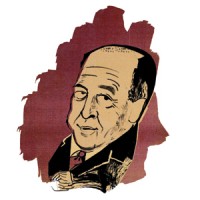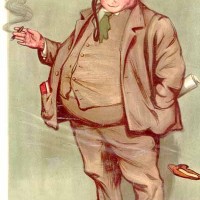Stand up for the real meaning of freedom, by Roger Scruton
When pressed for a statement of their beliefs, conservatives give ironical or evasive answers: beliefs are what the others have, the ones who have confounded politics with religion, as socialists and anarchists do. This is unfortunate, because conservatism is a genuine, if unsystematic, philosophy, and it deserves to be stated, especially at a time like the present, when the future of our nation is in doubt.
Conservatives believe that our identities and values are formed through our relations with other people, and not through our relation with the state. The state is not an end but a means. Civil society is the end, and the state is the means to protect it. The social world emerges through free association, rooted in friendship and community life. And the customs and institutions that we cherish have grown from below, by the ‘invisible hand’ of co-operation. They have rarely been imposed from above by the work of politics, the role of which, for a conservative, is to reconcile our many aims, and not to dictate or control them.
Only in English-speaking countries do political parties describe themselves as ‘conservative’. Why is this? It is surely because English-speakers are heirs to a political system that has been built from below, by the free association of individuals and the workings of the common law. Hence we envisage politics as a means to conserve society rather than a means to impose or create it. From the French revolution to the European Union, continental government has conceived itself in ‘top-down’ terms, as an association of wise, powerful or expert figures, who are in the business of creating social order through regulation and dictated law. The common law does not impose order but grows from it. If government is necessary, in the conservative view, it is in order to resolve the conflicts that arise when things are, for whatever reason, unsettled.
Read the complete article in The Spectator
Underrated: C.S. Lewis, by Judith Wolfe
Children’s books and popular presentations of Christian belief are what C.S. Lewis, who died 50 years ago this month, is best known for. But what makes him a favourite for earnest Christians’ christening and confirmation gifts — undaunted supernaturalism and doctrinal conservatism combined with an enticing rhetoric of certitude — makes him distasteful and a little suspicious to us intellectuals: “Mr Lewis is always clever” is the usual snub in Oxford Senior Common Rooms.
A.N. Wilson, in what is still the most widely read biography of Lewis, tries to dispel the magic by meticulously mapping Lewis’s intellectual development onto a well-worn Freudian chart of childhood trauma, repressed sexuality and frustrated ambition. But the diagnoses don’t really stick. There is no doubt, for example, that his mother’s death from cancer when he was nine left an indelible mark on Lewis’s psyche and imagination; but his responses to this and other blows were never obvious or merely reflexive. Indeed, one of the things that make Lewis remarkable is that, exactly contrary to Wilson, he never allowed experiences to become determining causes of his actions or convictions, but actively took hold of them as occasions for learning and, not least, self-questioning. The outcomes of such reflection were often unexpected, and Lewis accepted their consequences with uncompromising honesty.
One such conclusion was his conversion. The deaths first of his mother and then of his friends on the battlefields of the Great War aroused in the aspiring young poet a deeply felt and perfectly commonplace rage against a tyrannical God: “Come let us curse our Master ere we die, / For all our hopes in endless ruin lie. / The good is dead. Let us curse God most High,” Lewis wrote in his cycle of war poems, Spirits in Bondage, with all the consternation of Wilfred Owen or A.E. Housman. But probing further, he realised that it didn’t work — not because his protest was ineffectual but because it was incoherent. Richard Dawkins captures the reason well. When, at a 2012 podium discussion between Dawkins and Rowan Williams, an audience member asked tremulously what to make of the tragedy of an innocent child’s death, Dawkins shrugged that he could see here no puzzle or tragedy, but only an instance (sad perhaps for the mother, but unremarkable in itself) of the evolutionary principle of natural selection. Lewis came to the same conclusion: without God, there is no problem of evil. We may certainly ask, “If God exists, why does he allow evil?” — but we cannot answer that there is no God, or that he is a “brute and blackguard” morally inferior to any ordinary human, without also giving up our own sense of the outrage of evil. For if there is a creator God at all, then human reason, desire and moral intuition have their source in Him no less than the material world does; and if there isn’t, then any moral standard available to us can only derive from the same material processes that govern evolution, and so cannot ground the sort of outrage at the world’s futility that is irreducibly experienced as unconditional and absolute rather than merely relative and practical.
Read the complete article in Standpoint
Chesterton, el escritor británico a las puertas de la canonización, by Juan Manuel de Prada
En «La esfera y la cruz», el gordo Chesterton nos presenta a dos contendientes, un católico y un ateo, que pese a sus esfuerzos ímprobos no logran batirse en duelo a muerte, en defensa de sus convicciones, porque la autoridad establecida, muy tolerante y con-ciliadora, se lo impide. Obligados a convertirse en aliados, urdirán las más rocambolescas artimañas para burlar la vigilancia de esa autoridad que les impide enfrentarse; pero, finalmente, ambos serán detenidos y confinados como energúmenos, puesto que han osado perturbar la paz social con sus controversias teológicas. «La esfera y la cruz» se trata, por supuesto, de una novela alegórica que ilustra a la perfección el totalitarismo agnóstico que, so capa de moderantismo y neutralidad, acaba imponiéndose en las sociedades contemporáneas.
Contra ese agnosticismo aplanador y paralizante combatió Chesterton toda la vida, fingiendo que combatía con los ateazos peleones que se iba encontrando por el camino. Si leemos sus novelas y ensayos, descubriremos que Chesterton siempre trata a los ateos con deferencia e incluso franca simpatía; y que, en cambio, reserva su acritud para los que evitan la lucha, para esos espíritus «conciliadores» que tratan de aunar las doctrinas más diversas (sin adherirse a ninguna) y de agradar y halagar a todo el mundo. Chesterton entendía que la defensa de las propias convicciones solo se podía alcanzar mediante la disputa; pero en sus disputas, sobre sus dotes de polemista, se alza una alegría de vivir contagiosa, un amor hacia todo lo creado que se extiende también hacia sus contrincantes, quienes –aunque mohínos ante el vigor paradójico de sus razonamientos– no podían sin embargo dejar de aplaudir su gracioso denuedo.
Chesterton se entromete en los dobladillos de las medias verdades
En Chesterton conviven la sabiduría de la vejez, la cordura de la madurez, el ardor de la juventud y la risa del niño; y todo ello galvanizado, abrillantado por la mirada asombrada y cordial de la fe. En su constante exaltación de la vida (que no es hedonismo, sino confianza en la Providencia), en su perpetuo arrobo ante el misterio, en su deportiva y jovial belicosidad, subyace siempre una aversión risueña hacia toda forma de filosofía moderna, a la que contrapone el realismo de la fe cristiana: «La muralla exterior del cristianismo es una fachada de abnegaciones éticas y de sacerdotes profesionales; pero salvando esa muralla inhumana, encontraréis las danzas de los niños y el vino de los hombres; en la filosofía moderna todo sucede al revés: la fachada exterior es encantadora y atractiva, pero dentro la desesperación se retuerce, como en un nido de áspides».
Un niño que destripa un reloj
Toda la obra de Chesterton, en realidad, no es otra cosa sino una glosa de las verdades de fe contenidas en el catecismo, expuesta al modo grácil y malabar de un artista circense. Como escribió Leonardo Castellani, para poder enseñar el catecismo a los ingleses había que tener una alegría de niño, una salud de toro, una fe de irlandés, un buen sentido de «cockney», una imaginación shakespeariana, un corazón dickensiano y las ganas de disputar más formidables que se han visto desde que el mundo es mundo.
Nos descubre que el sentido común está en aquello que nadie se atreve a formular
Nada de esto le faltó a Chesterton; y con esta munición de cualidades –más alguna pinta de cerveza– cuajó una escritura luminosa e incisiva, capaz de entrometerse en los dobladillos de las medias verdades para delatar su fondo de mugrienta mentira, capaz de desvelar la verdad escondida de las cosas, sepultada entre la chatarra de viejas herejías que nuestra época nos vende como ideas nuevas.
En los libros de Chesterton, las verdades del catecismo se ponen a hacer cabriolas, se pasean por el mundo como si estuvieran de juerga, llenando cada plaza de ese fenomenal escándalo que nos produciría ver a un señor en camisón o a una damisela con bombín; y de esta aparente incongruencia que surge de la lógica más aplastante cuando se hace la loca brota su poder de convicción. Chesterton se pasó la vida refutando todos los tópicos (que es la expresión más habitual de las modernas herejías), hasta descubrirnos que el sentido común no está en lo que todos repiten, sino en lo que nadie se atreve a formular; y lo hizo divirtiéndose como un niño que destripa un reloj y luego lo recompone cambiando de sitio todas las piezas, para demostrarnos que no debemos preocuparnos por medir el tiempo, pues dentro de nosotros habita la eternidad.
Read the complete article in ABC Cultural


